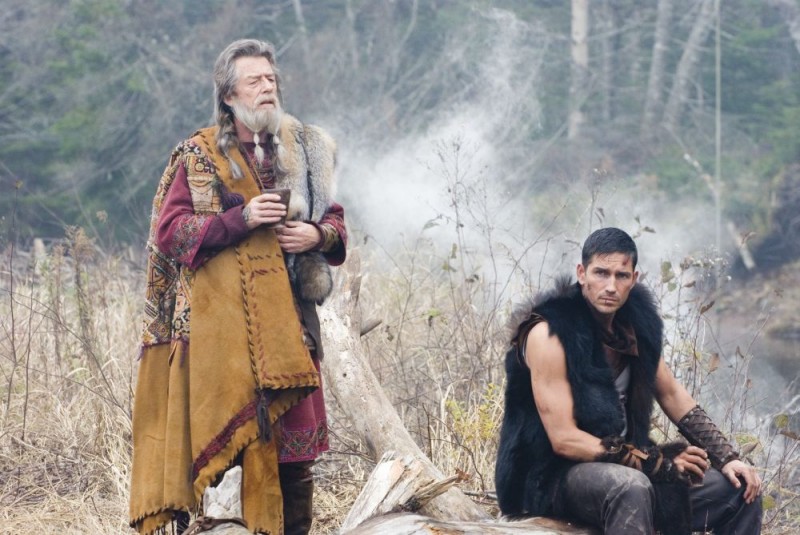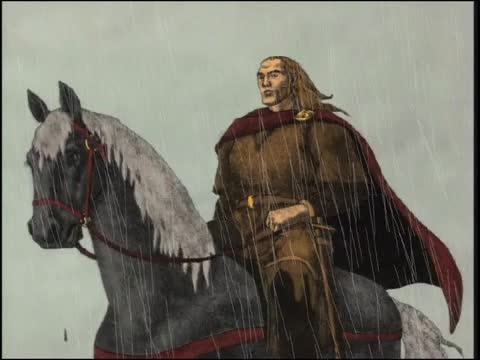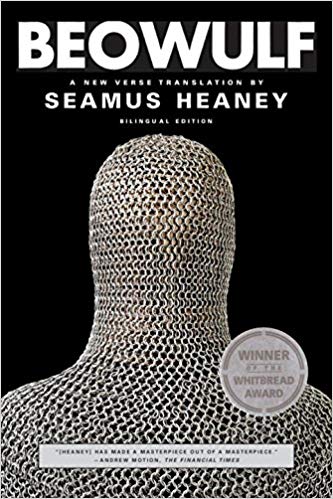Don't miss your chance to invest in 'Fabiola'!
Visit our crowd-funding page to help make Catholic movies!
- Home
- Books Made into Movies
- Beowulf
Beowulf Films: Modern Takes On An Epic Classic
Disclaimer: As an Amazon Associate, I receive a small commission if you purchase items on this page at no extra cost to you.
Beowulf symbolizes the soul, and the three monsters that he faces represents the same dangers that every soul encounters: the world, the flesh and the devil.
The ancient epic poem, Beowulf has delighted readers for countless generations. Some of us are huge fans of the book and have read it several times. This year we sat down and watched a few films that have been made from the great story.
A sci-fi version was action packed and imaginative, and one cartoon version was worth the watch. We wanted to review the 2005 version titled Beowulf and Grendel because it is said to be the closest to the book, but we were prevented from watching it after reading that there is an inappropriate scene. We are willing to forego accuracy over indecency in films. There is no place for this in the book so there is no reason to add it in a movie. Read on to learn which adaptations get the thumbs up from Industrious Family.
A Sci-Fi Adventure: Jim Caviezel's Outlander Inspired By Beowulf's Legend
If you want to see Jim Caviezel act like Russel Crowe in Gladiator, then Outlander (2009) is certainly a good pick. It was wise not to name this film Beowulf because it is not the same story. Directed by Howard McCain and produced by Berry Osborne, who also the produced The Lord of the Rings, the film is a blend of genres.
The sci-fi adventure opens with a man surviving a shipwreck and finding himself in a strange land: Norway in 709 AD. Soon, he is captured by a local tribe of Norsemen and brought to their king. When asked what he was doing, he replies that he was hunting a dragon. The tribe laughs, but that evening, they discover the "outlander" was telling the truth—there is indeed a monster in their midst.
Caviezel plays Kainan, a character who parallels Beowulf but with a different name. Like Beowulf, he is a perfect hero with no noticeable character development. Beowulf is known for his virtues, especially humility, which is similarly portrayed in Kainan’s story. In contrast, Wulfric (Jack Huston) is proud, vengeful, and jealous. Wulfric's character changes over time, eventually honoring Kainan not only for his courage but also for his quick wit and unfailing friendship.
Outlander is a mixture of The Lord of the Rings, Gladiator and Jurassic Park. While certain elements, particularly the climax, closely follow the Beowulf plot, we agreed that Outlander should not be considered an adaptation of the story.
There were a few plot points, however that made the movie not Beowulf.
We've tried to keep it back but we’re saying it now: Kainan is an alien. This fact makes the story divorced from the book. When his spaceship crashes into earth, it brings the monster with it. Kainan feels responsible and his goal is to destroy it before it does to earth what it did to his planet.
The book Beowulf is a deeply religious, God-focused tale, which is largely absent from the movie. While a priest is seen attempting to preach to the Vikings, they cling to their pagan beliefs. In the book, Grendel is described as a demon from a cursed race, but in the film, the priest’s attempt to exorcize the monster fails and ends with the priest's death. It would have been more powerful if the creature had recoiled at the sight of the cross.
Something that made Kainan unlike the book's hero is that Beowulf credited his strength and valor to God. In the book, Christianity has already come to the Geats and therefore Beowulf is the premier warrior because of his trust in God. Kainan, however, knows no god.
Points to consider: There were offensive words used sparingly throughout. We’re not crazy for the female warrior slant and there was one scene where her torso is hardly dressed but after that she resumed her feminine role and normal activities. Her subtle romance with Kainan was clean and did not overshadow the plot. The monster is a man-eater, so the film may be frightening for children.
Animated Epics Faithfully Brings To Life The Heroic Story Of Beowulf
After the intensity of Outlander, we decided to watch something lighter before heading off to bed: the 1998 Animated Epics: Beowulf. This short 25-minute cartoon stays true to the original story, even using direct quotes from the book, narrated by Derek Jacobi. The animation was unusual and a bit distracting at first but grew on us as the film progressed.
This version followed quite accurately the life of the brave and fearless warrior as he aids the Danes in their afflictions. After a man-eating monster named Grendel awakens at the smell of wealth and gold, he plagues the Great Hall every night while the men are asleep.
The woe of this land reaches the ear of a Geat warrior who embarks on an adventure to save these sad people. After a hand-to-hand fight that turns into a wrestling match, Grendel flees the scene but not without loosing his arm in the tight grip of Beowulf (voice of Joseph Fiennes from the film Risen). Grendel crawls to his miserable hole and dies.
Beowulf’s battles are far from over. Grendel’s mother rises to avenge her son and attacks the Great Hall, but Beowulf defeats her too. After his victory over the she-monster, Beowulf lives to an old age, but is eventually called upon for one last battle to defend his people.
This cartoon faithfully retells the epic, subtly incorporating the story’s Christian elements.
From Slaying Monsters To Viking Funeral Pyres: The Epic Poem Has It All
The concept of heroism is embodied in the ancient tale of Beowulf. The central figure, Beowulf, possesses and displays the virtues that are essential as king and warrior - qualities that modern readers should study. The story relates the might of a God-fearing man, who, too strong for any sword, challenges a cowardly creature that attacks innocent people at night. Beowulf credits all his victories to God, walking through life as God intended—blameless and perfect.
Beowulf also embodies every fundamental trait of a good warrior, particularly temperance. A key line from the book illustrates this:
“Beowulf bore himself with valour; he was formidable in battle yet behaved with honor and took no advantage; never cut down a comrade who was drunk, kept his temper, and warrior though he was, watched and controlled his God-sent strength and outstanding natural powers.”
Beowulf’s achievements in battle are attributed to God’s will, showing that a warrior must possess humility and not abuse God’s gifts, with pride being man’s greatest shortcoming.
Beowulf is basically the story of a soul and the three monsters the main character faces symbolize the dangers every soul encounters: the world, the flesh, and the devil. Grendel, the first monster, represents the world, and Beowulf faces him in his prime. Grendel’s seductive mother represents the flesh, and the final dragon symbolizes the devil’s final attack on the soul during its decline. This is the hardest battle, for the soul is weary of fighting, but it is the most important skirmish.
A modern reader can learn from Beowulf the pattern of heroism. His story teaches us when to take necessary risks for the greater glory of God and the safety of others. Nations need heroes who, like Beowulf, stand as bulwarks during troubled times. Beowulf’s legacy is one of courage and virtue, rooted in the fear of the Lord.
Do You Have Your Favorite Beowulf Film Adaptation? How Do These Modern Adaptations Compare To Your Reading of Beowulf?
Subscribe To Our FREE Email Newsletter:
Our Mission
We believe storytelling has the power to shape souls. In a world where mainstream media often undermines faith and virtue, we are dedicated to reclaiming the art of filmmaking for Christ and His Church. Our mission is simple yet bold: to populate the movie industry with good, Catholic films that inspire, uplift, and ignite a love for truth and beauty.
Populating the movie industry with good, Catholic films that inspire, uplift, and ignite a love for truth and beauty.

















